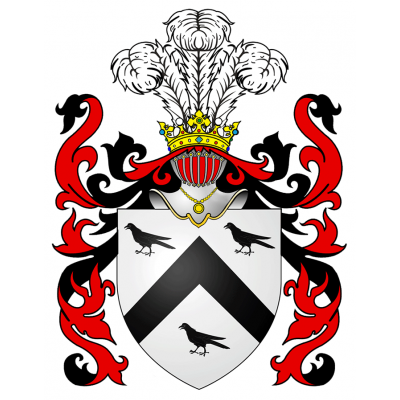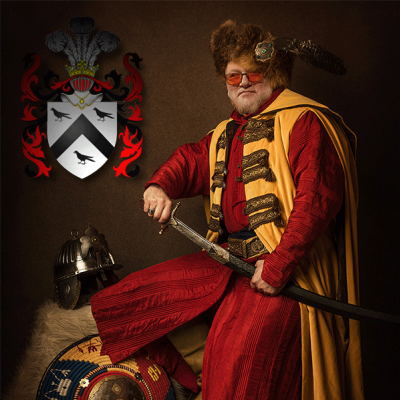geneza
Genesis
Augustyński to polskie nazwisko pochodzenia zachodnioeuropejskiego /forma żeńska: Augustyńska, liczba mnoga: Augustyńscy/. Etymologia nazwiska wskazuje na pochodzenie od łac. augustus, tzn. “dostojny”, “majestatyczny”, “okazały”, “poświęcony”, “godny podziwu”. Jako tytuł, Augustus przysługiwał cesarzom rzymskim i królom. Wywiedzione z niego włoskie nazwiska, np. “Augusto”, “d’Agostino”, “Agostini” występowały wśród patrycjuszy, oznaczając osobę “obdarzoną dobrą wróżbą”. “Augustine” jest starożytnym anglosaskim nazwiskiem, które zyskało popularność w okresie Średniowiecza na terenie Anglii i Europy Zachodniej. Stało się to dzięki dwóm świętym: Augustynowi z Hippony i Augustynowi z Canterbury, mnichowi benedyktyńskiemu, ewangelizatorowi wysp brytyjskich. W XII w. upowszechniło się wśród krzyżowców, powracających z Ziemi Świętej. W późniejszym okresie stało się rzadsze w czasach Henryka VIII ze względu na związek semantyczny ze “starą religią”.
Genesis – Obserwacja:
Przymiotnik “augustyński” określa związek znaczeniowy z Augustynem z Hippony i jego doktryną tj. augustynizmem. Również jako czas panowania elektorów saskich, noszących imię August, tzw. “wiek augustyński”. Ród ten cechuje starożytny herb Uriena, władcy Rhegedu z VI w., w którym występują krokiew /chevron/ i trzy kruki. W herbach zachodnioeuropejskich rodów, noszących nazwiska, będące wariacją “Augustine” występuje krokiew /chevron/, symbolizująca budowniczych fortec i opiekunów słabszych. Łączono ją m.in. z potrójnym krzyżem /Austin/, gwiazdą /Agosto/, koroną /August/ lub krukiem /Augustin/. Nazwisko Augustyński występuje w spisach mieszczan Warszawy, Tylicza, Śmigla, w historii VI wojny polsko-szwedzkiej, polskiego ruchu ludowego. Także dążeń wolnościowych w okresie zaborów, II Rzeczypospolitej, okupacji hitlerowskiej i PRL.
Genesis – Rozważania:
W księgach parafialnych prowadzonych w języku łacińskim, starszych niż XX-wieczne nazwisko jest zapisywane jako “Augustinski”. W tej formie pojawia się w Prusach Wschodnich i na terenie Saksonii. Stamtąd pochodzili polscy władcy z dynastii Wettynów: August II Mocny i August III Sas. Nosił je aktor niemiecki Peer Augustinski /1940–2014/ oraz jego córka, Olivia Augustinski /ur. 11 grudnia 1964/, niemiecka aktorka, tancerka, postać telewizyjna. Poza Polską nazwisko występuje w formach: “Augustynski”, “Augustinski” lub “Augustinsky”, najczęściej we Francji, Słowacji, Niemczech. W grudniu 2022 nazwiska Augustyński używało w Polsce 914 osób: 456 kobiet i 458 mężczyzn.
Genesis – Historia:
Najstarsze dzieje Liceum Ogólnokształcącego dla Dorosłych splatają się z historią obecnego I Liceum Ogólnokształcącego im. St. Staszica, funkcjonującego w roku 1945 pod nazwą Państwowe Liceum i Gimnazjum pod dyrekcją dr Henryka Augustyńskiego. Od 1945 r. do chwili obecnej szkoła średnia dla dorosłych mieści się w budynku wymienionego liceum młodzieżowego. II Liceum Ogólnokształcące im. Króla Jana III Sobieskiego w Krakowie, to szkoła średnia działająca w Krakowie od 1883 roku. Z nim też związane jest nazwisko Augustyński. II Liceum Ogólnokształcące im. Króla Jana III Sobieskiego w Krakowie, dawniej III Państwowe Gimnazjum im. Króla Jana Sobieskiego – szkoła średnia (liceum ogólnokształcące) znajdująca się w Krakowie przy ulicy Jana Sobieskiego 9–13, na Piasku. Działa od 1883 roku.
Genesis – Podsumowanie:
W 1897 r. szkoła przeniosła się do nowego budynku, zaprojektowanego przez Józefa Sarego. Mieści się ona przy ulicy Sobieskiego 9, gdzie mieści się do dzisiaj. Podczas I wojny światowej wielu Sobieszczaków uczestniczyło w walkach, część oddała życie za ojczyznę. Po odzyskaniu przez Polskę niepodległości uczniowie ufundowali pamiątkową tablicę znajdującą się obecnie wewnątrz szkoły. Ta kontynuowała swoją działalność pod nazwą III Gimnazjum im. Króla Jana Sobieskiego. W 1906 roku gimnazjaliści założyli pierwszy klub piłkarski w Krakowie. W 1923 roku założyli również pierwszą w Krakowie sekcję hokeja na lodzie.
Genesis - End:
Po wielu latach i perypetiach życiowych wreszcie mogę nosić swój herb rodzinny i wydaje mi się, że w pełni na niego zasłużyłem - wiedzą, umiejętnościami i dbałością o tę polską ziemię i język. Przez wiele lat ludzie szlachetni w Polsce byli prześladowani, więzieni i mordowani, a do dziś pokutuje przekonanie, że to oni wszystkiemu byli winni. Nie tak wygląda historia, a to że byli i są prześladowani powoduje marazm społeczny, gdyż ludzie głupi /prostacy/ stoją u władzy. Czas zrozumieć co ta szlachetność za sobą niesie i dlaczego przez niektórych jest porządana skoro zmieniali i zmieniają nadal nazwiska na 'ski, pozostając nadal tylko przechrztami. Zmiana nazwiska nic nie wnosi. Czas też najwyższy zwrócić się do tych szlachetnych ludzi o pomoc, wykorzystać ich mądrość i wiedzę, inteligencję i rodowód, gdyż w innym wypadku będziemy trwać tam gdzie jesteśmy, czyli w ciemnej d... Europy - bez szlachetności, bez świadomości, bez patriotyzmu i bez wiedzy o czymkolwiek. Już dziś mamy kłopoty dopuszczając ludzi miernych i przechrzty do władzy. Widać to juz gołym okiem.
Pozdrawiam
Witold Augustyński










